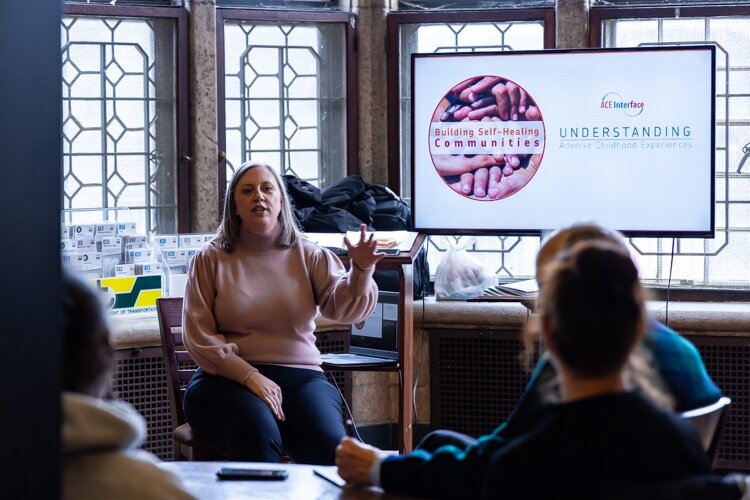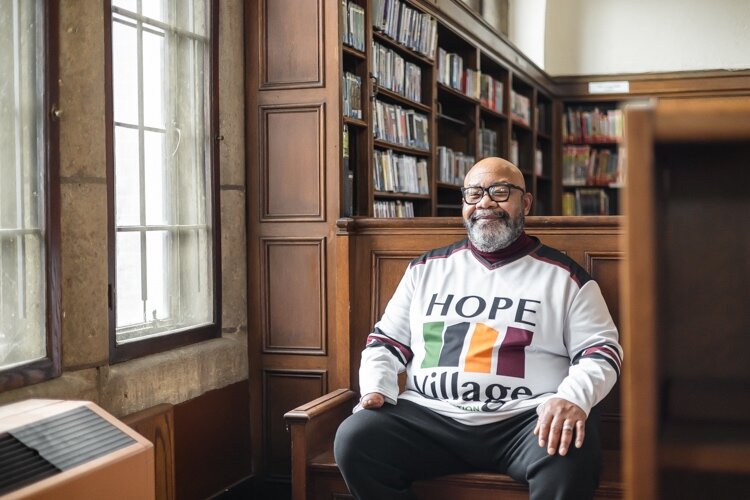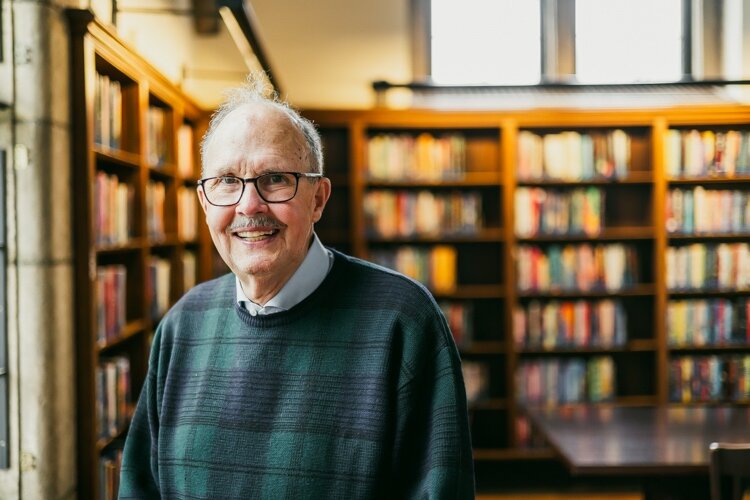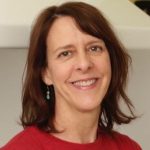Resilient Neighborhoods: Can putting health at the forefront help bring a neighborhood back?
Health consciousness can be contagious, especially with a little nudge from friends and neighbors – and nearby places to go for healthy food, exercise and healthcare services. Read about how the Hope Village neighborhood in Detroit is embracing and uplifting health and wellness for community members.
Jeffrey Jones is a lifelong resident of Detroit’s Hope Village neighborhood. He fondly remembers growing up in the neighborhood when it seemed to offer everything a young boy needed and more.
From his house on Clements Street, he would wake up to the smells of fresh bread from the New Modern Jewish Bakery on Linwood and Glendale and coffee roasting from a roasting facility at Hamilton and Oakman. Men headed out to jobs in the plants or elsewhere each day, and adults kept an eye on neighborhood kids, so there was no skipping school. He could hop on the Linwood bus to catch a game at Tiger Stadium.
“That’s why I have this enduring love for Detroit,” says Jones. “It’s been my playground since I was a child. I feel at home here. I feel safe here.”
But he also remembers people starting to move out of the neighborhood and conversations with his father after the first house was torn down. He recalls his father saying that things were getting bad but that one day it would turn 360 and the neighborhood would come back.
In the mid-1980s, that could not have been further from the truth. Jones questioned his father’s prediction of a comeback.
But now, he is seeing it going through change, starting to come back. “It took 30 years, but I’ve lived long enough to see it starting to make this transition,” says Jones.
Part of that change, Jones believes, started with prioritizing personal health and community health.
Jones, executive director of HOPE Village Revitalization, has witnessed firsthand that the health of community members can lead to community change and betterment.
The steps to drive that change have been both intentional and organic.
“In my life, I’ve worked in a lot of communities around the city, but I’ve never worked in a community that actually embraced their personal health as a priority like this one,” Jones says. “We deal with crime, blight, unemployment, the usual things that communities latch onto to advocate for. Here we’re talking about living our best and longest lives.”
Below, Jones talks about the health landscape in the community – the personal determination of neighbors as well as the structured programming – that are helping to create a healthier neighborhood.
Hope Village boundaries are Dexter Ave. to the west, Hamilton Ave. to the east, the Lodge Freeway to the north, and W. Davison St. to the south. Oakman Boulevard cuts through the middle.
Neighborly peer pressure
“We have a self-monitoring blood pressure program through the American Heart Association to encourage residents to take their blood pressure regularly and report their numbers. ‘These are my numbers’ and ‘Hey neighbor, my blood pressure’s better than your blood pressure.’ It started out kind of catchy like that, but, more and more, our residents are doing it. We’re talking about what we’re eating in terms of fast food and its impact on blood pressure.
“The greatest piece is the peer-to-peer relationships that are built. It is not a medical professional telling you to take your medicine. It’s your neighbor who’s calling to check up on you. What we’ve found, even in national studies, is that’s the critical linkage in terms of maintaining health. You go to the hospital when you’re sick. The doctor gives you a prescription or a treatment. But if you go home and you don’t follow that treatment, you’re not going to get better.”
Making it social
“When I came on board [as executive director of HOPE Village Revitalization], I saw the potential in our health initiative, but for me, I’m always thinking, ‘How do I sell it to my neighbors? How do I get them to want to embrace this?’ I know the value of it, and it sounds good to me, especially as the executive director. How do I get my neighbor, who’s struggling with childcare and making ends meet, think about this soft and fuzzy thing that we call social determinants of health. It’s really about selling that to people.
“It’s me getting on my tricycle, riding up and down the street in the summertime on our community bike rides. I’m talking to you as my neighbor, we’re meeting, we’re getting exercise. More importantly, we’re modeling this for other neighbors. We’re more than just talking about this as an organization.”
You are what you eat
“We operate a weekly farmer’s market during the summer. During the off season, we also distribute Eastern Market fresh produce boxes to residents in the community. This year, we were getting vegetables that I personally had never seen. We were all collectively learning as a community what you do with a kohlrabi. I had no idea. We were on this shared learning experience this summer trying out new vegetables.
“In August, they [the Citizen Deliberation and Health group] took a trip together to Blocks Stand and Greenhouse in Romulus and visited other local produce stands. They called it their Fresh Food Tour. With the produce they purchased, they made recipes, which eventually they compiled into a cookbook for themselves.
“One of our board members, Khary Frazier, who’s from Detroit, is a podcaster and social media influencer. He had an event in September, a Collard Greens Cook-Off. There must have been close to 1,000 people at the Andy Arts Center. It was one of the biggest events we had in the neighborhood last year.
“We had about 12 different chefs who did their own unique take on collard greens. There was livestreamed music. It was a great community event about collard greens. I’m excited about what this can mean for our community because it brings us together. The most important thing is that we’re getting healthier. We’re doing good by our bodies.”
Spreading the love
“[At HOPE Village Revitalization] we are a small team, seven individuals, four full time. We are having to miraculously expand our capacity to take on some of these new tasks. We were recently awarded the Kresge NSHE, National Stewards for Health Equity, grant.
“So, in addition to us delivering our own programs, we’re going to be a grantor to other smaller community organizations who are working in the health space to reform the ecosystem of health delivery in our area, but in a more granular sense.
“We also have the Citizen Deliberation and Health project, made up of residents from the Village of Oakman Manor and local residents here. They were two separate groups. With group facilitators [and] residents, they decided what they wanted to do to address different social determinants of health. One group brought in a trainer who worked out with them every week over the years. They’ve had seminars; they’ve brought in health professionals to advise them on diet and exercise.
“Wayne State School of Social Work wrote a grant for the original Citizen Deliberation and Health project and funded that work. It’s grown over the years and continues to grow. Now, in its third iteration, we’re going to be mentors to two other neighborhoods in Detroit as well as a rural community in Burton, Michigan, to pilot their own neighborhood health deliberation groups.”
Connecting to clinics
“One of our frustrations has always been an Advantage Health Clinic across the street from us that nobody in the community uses. Go figure. Where is the disconnect? I was really adamant that if I had the carrot to offer this health business they might serve the residents. So instead of me just yelling and shaking my fist, if I have financial resources, asking, ‘What is it that you need? Can the community step up and help you be a good neighbor to the community?’
“We had a breakthrough conversation with the Advantage Health folks recently. I’m fortunate we have some great volunteers. Dr. Felix Rogers is a volunteer supreme. He’s a retired cardiologist. As I’m told, he was the first person in Michigan to do the robotic arthroscopic surgery on the heart. That’s a side story. Dr. Felix, he’s a go-getter. He’s just out everywhere trying to bring health resources to the community.
“Dr. Felix was able to connect with one of their administrators at another clinic who assured me that we’re going to be sitting down in the coming weeks and that they want to welcome the residents. Okay, let’s do it. What have we been waiting for? Let me help you.”
Collaboration and cross-pollination
“The Hope Village Collaborative is made up of all the neighborhood organizations. Over the years, especially after the pandemic, some of those groups have fallen off. We still have a core group of about 12 organizations, neighborhood groups, other neighborhood nonprofits who are doing small scale developments in pockets of the neighborhood.
“It allows us to cross-pollinate each other’s efforts. We’re very thankful to CDAD [Community Development Advocates of Detroit] who funded our neighborhood table work this past year and allowed us to do our first collective group project, which was our Harvest Hop. I’m hoping that same energy is going to carry forward this year as we try to bring all of those partners together around health.
“Our target is men’s cardiovascular health, so we’re looking to do some innovative programming and bring together other health partners to do something for men’s health this year. If we’re successful, we’re hoping to replicate it and get more funding to continue each year with a different theme. Perhaps it’s maternal health next year, but each year we have a theme that we’ll come together around as a community to try to target with better information.”
And horses
“Detroit Horse Power is very close to breaking ground on the city’s first urban equestrian center. It’s going to be the largest one in the country. I sit on the board of Detroit Horse Power. I’ve been a fan of theirs for more than 10 years now.
“It’s going to be a regional destination. People are going to come from everywhere to see this. There will be an indoor barn, an outdoor paddock area, and a community space where folks will be able to have community meetings. On the second story, a mezzanine will overlook the riding area. It’s so beautiful.
“What I’m so proud about, from the very beginning, we thought about how to integrate this into the community? What do you do with the smells? We needed the neighbors to have their fingerprints on this. I mean, from the design of the two double-layered fences around the exterior to figuring out how do we landscape a corner, which is known for vehicular accidents.
“I put all that [health programs and health-conscious community members] into this big bowl, and I say our neighborhood is great because it meets you where you are. Whether you are wealthy living on Oakman Boulevard or you’re a panhandler, we are welcoming of everybody because it takes all of us to make this community.
“It’s a wonderful community. So much love here.”
Resilient Neighborhoods is a reporting and engagement series examining how Detroit residents and community development organizations work together to strengthen local neighborhoods. It’s made possible with funding from The Kresge Foundation.









